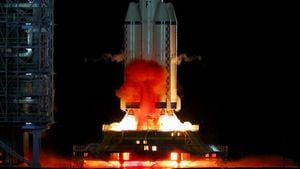California has become the latest battleground for regulating artificial intelligence (AI) technology, with Governor Gavin Newsom recently announcing initiatives aimed at both advancing and safeguarding the rapidly growing industry. Just days after he vetoed SB 1047, which was poised to be the most stringent AI safety law in the U.S., Newsom shifted gears by implementing his own measures focused on the responsible deployment of generative AI (GenAI).
This announcement marks a significant moment for both California and the tech industry at large, as it reflects the balance Newsom is trying to strike between innovation and regulation. At the crux of the recent legislative push is the growing concern over potential risks posed by AI, which many experts say could lead to severe consequences if left unchecked.
Speaking from Sacramento, Newsom outlined how the state would collaborate with experts including Dr. Fei-Fei Li, widely regarded as the 'godmother of AI,' to develop what he termed “responsible guardrails” for GenAI deployment. This purportedly includes assessing the risks associated with AI’s capacity to disrupt infrastructure, manipulate information, and impact societal norms. Newsom’s initiatives involve not just tech regulations but also comprehensive assessments of potential catastrophic events stemming from AI technologies.
“We have a responsibility to protect Californians from potentially catastrophic risks of GenAI deployment,” Newsom asserted during the announcement. It seems he's determined to lead on AI oversight, especially amid federal inertia on the topic.
Earlier, the proposed legislation SB 1047 received overwhelming support from California lawmakers. It sought to establish rigorous standards for AI models, including accountability measures for tech companies and mandatory disclosure of safety protocols. Under the bill, companies would have faced legal consequences for damages caused by their AI systems. Supporters, including influential figures like Elon Musk, championed the bill for its potential to inject transparency and accountability within the AI industry.
Nonetheless, citing concerns from prominent tech leaders, Newsom expressed apprehensions about the nature of the regulations set forth by SB 1047. He mentioned, “While well-intentioned, SB 1047 does not take fully account whether an AI system is deployed in high-risk environments,” pointing to possible negative impacts the bill may have had on smaller businesses and innovation. The Governor’s veto has sparked heated debate, particularly among those advocating for stronger safeguards on powerful AI technologies.
Following the veto, Newsom swiftly pivoted to support initiatives focusing on practical aspects of AI oversight. He signed 17 bills within the past month aimed at regulating various facets of AI, encompassing areas like deepfakes, the protection of children, and misinformation. This suite of legislation is reportedly the most comprehensive collection of regulations around AI seen across the nation.
One standout piece of legislation is SB 896, which tasks California's Office of Emergency Services with assessing the threats posed by GenAI to state infrastructure. This foreshadows the necessity of engaging state and local parties to evaluate how AI technology can be misused, inadvertently causing widespread harm.
It’s clear California is positioning itself as the epicenter of AI development and regulation. Home to over 32 of the world’s leading GenAI companies, the state has not only made significant strides technologically but has also been proactive about mitigating associated risks. It has already utilized AI technology to tackle state challenges, from traffic reduction to homelessness solutions.
Despite the vast scope of Newsom’s initiatives, the tech industry remains divided. Many tech giants argue against rigorous regulations, claiming they would stifle innovation and deter investments. Still, proponents like the National Academy of Sciences and other AI researchers insist on the need for accountability measures to safeguard public welfare.
Newsom's strategy indicates his intention to maintain California’s competitive edge as the leader in AI innovation and standards. Yet, it remains to be seen how effectively these new measures will mitigate risks without hampering the sector’s growth potential.
Experts suggest the path forward requires collaboration among lawmakers, industry leaders, and research institutions to develop nuanced regulations capable of adapting to AI's fast-paced evolution. The call for protective measures is supported not just by fears of job displacement or misinformation but also concerns over privacy and security.
It's worth noting, the vetoed SB 1047 included provisions for establishing “kill switches” for AI systems, which had been highlighted as necessary tools for controlling rogue AI applications. Without such measures, the risk of unintended consequences grows with the advancement of technology. Senator Scott Wiener, co-author of SB 1047, criticized the veto, asserting it leaves California without binding measures to protect the public from potential harms inflicted by the tech industry.
The controversy surrounding these legislative attempts reflects broader challenges faced by regulators worldwide as they grapple with technology outpacing existing laws. The discussions occurring within Silicon Valley and beyond are indicative of the greater narrative around the societal impacts and ethical dilemmas posed by AI today.
While California has seen successes with some AI regulations, such as protecting individuals’ digital likenesses, the broader picture remains unclear. With major players like OpenAI and Google actively lobbying against stringent regulations, the political will to streamline AI oversight is sorely tested.
California appears to be at a crossroads, trying to lead the way toward responsible AI use—utilizing the input of experts, responding to concerns voiced from all corners, and adapting laws to reflect the dynamic nature of technology. The interplay between regulation and innovation will undoubtedly define the way forward for one of the most transformative industries of our times.
Will these newly announced initiatives by Governor Newsom pave the way for responsible AI development? Or will industry pressure lead to more relaxed regulations moving forward? Time will tell.



